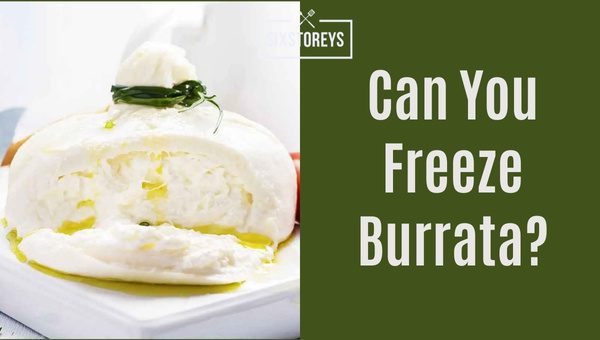Can You Freeze Burrata? Yes, and Here’s How to Keep It Creamy
Burrata, with its creamy center and delectable mozzarella shell, has taken the culinary world by storm, gracing plates with its rich and indulgent presence. Many of us who adore this Italian cheese face a common dilemma - the question of preservation. "Can you freeze Burrata?" is a query frequently whispered among food enthusiasts trying to prolong the lifespan of their beloved cheese without compromising its distinctive qualities.
This topic has sparked discussions from kitchen counters to online forums, and today, I'm delving into the heart of the matter to bring you answers that could save your burrata from going to waste. Whether you're a home cook, a cheese lover, or just curious, join me as we explore the cold facts about freezing burrata and how it affects its charm and flavor.
Also Read: Can You Freeze Croissants?
Article Includes
Can You Freeze Burrata?

Yes, you can freeze burrata, but it's essential to go into this process knowing that the thawed cheese might not maintain the exact lush texture and taste you know and love. Burrata's magic lies in its freshness, with the creamy stracciatella and cream interior lovingly tucked into a smooth mozzarella pouch. This delicate composition is both a blessing for your taste buds and a challenge for preservation.
When frozen, the water content within the cheese forms ice crystals, which can alter the structural integrity of burrata. Upon thawing, these ice crystals melt, potentially leading to separation and a noticeably different mouthfeel. Moreover, the cold environment of the freezer can dampen the cheese's vibrant flavors. Though these changes can be mild, they're worth considering, especially if you're planning to savor the burrata in its traditional, uncooked form.
Of course, if you're in a situation where your burrata is nearing its expiration and you can't bear the thought of good cheese going to waste, freezing is a viable option. It's simply a matter of adjusting expectations and perhaps getting a bit creative with how you'll use the cheese once it's thawed. Think pastas, baked dishes, and other culinary creations where burrata can shine in a new light. Just remember, the thawed product might be best suited to recipes where texture is complemented by other ingredients, rather than the star of the show.
The Great Debate: To Freeze or Not to Freeze Burrata

Burrata cheese, with its luscious cream-filled center wrapped in a tender mozzarella pouch, elevates any meal to a gourmet experience. Yet, in the depths of our fridges, we're often faced with a pressing conundrum: how do we preserve this artisanal delight? The question of whether to freeze burrata or not is a topic that garners passionate opinions on each side.
Preservation Enthusiasts argue in favor of freezing, touting the ability to extend burrata's short shelf life beyond the ticking time bomb of a few days. They believe that by stowing it in the freezer, you have the power to halt the clock, giving yourself a chance to enjoy this dairy indulgence at a later date.
Conversely, Purists firmly stand their ground with a resounding no. They emphasize that burrata's signature allure lies in its freshness. The silken texture, the gentle burst of the cream, and the delicate flavor profile are characteristics that, according to some, risk being lost once exposed to the frosty climes of your freezer. Freezing could potentially alter burrata's integrity, leading to a less than optimal culinary experience upon thawing.
This debate isn't merely a matter of preference; it touches on the essence of what makes burrata so special. To freeze or not to freeze burrata? That is the question that continues to challenge chefs and cheese aficionados alike. With factors like texture, taste, and intended use at stake, it's a decision not to be taken lightly.
As we embark on this journey to unearth the truth, let's tread carefully through the icy waters of food preservation wisdom. It's time to weigh the evidence, uncover the secrets, and determine whether freezing burrata is a kitchen hack or a culinary sin.
How Freezing Affects Burrata's Texture and Taste?
Burrata, the buttery treasure of the cheese world, is known for its delicate outer shell and the lush, creamy interior that spills out upon the first cut. Its texture is as much a part of its appeal as its rich, milk-forward flavor. So the million-dollar question is, can your freezer do justice to burrata's divine qualities?
When burrata is subjected to freezing, the water content inside the cheese forms ice crystals, which can fundamentally alter its texture. The once smooth and supple cheese may become grainy or crumbly once thawed. Freezing is an Achilles' heel for many fresh cheeses, and burrata is no exception.
As for the taste, freezing can dull the freshness that burrata is celebrated for. While it may still retain a milky sweetness, the intricate flavors may lose their vibrancy, leaving you with a cheese that whispers rather than sings. Keep in mind, freezing burrata should be a last resort, especially if you're planning to savor it in its traditional, fresh form.
Step-by-Step Guide to Freezing Burrata in 2025

If you find yourself in a situation where you must freeze burrata, here's a step-by-step guide to do it with care:
1. Drain Excess Liquid
Before freezing, gently remove your burrata from its brine and let it drain. Excess liquid could form additional ice, affecting the texture even further.
2. Wrap with Care
Wrap your burrata carefully in cling film, ensuring that it's as airtight as possible. This will help to protect its delicate shell and preserve the moisture within.
3. Seal and Freeze
Place the wrapped cheese in a freezer-safe bag, squeeze out as much air as you can, and seal it tightly. Label the bag with the date, so you're aware of how long it's been in the freezer.
4. Slow and Steady Wins the Race
When freezing burrata, do so gradually. Place it in the back of your freezer where the temperature is most constant. Avoid placing it next to items with strong odors to prevent taste transfer.
5. Thawing Time
Thaw your burrata slowly in the refrigerator when you're ready to use it. Rushing this process at room temperature could result in an undesirable texture and potential bacterial growth.
Remember, while freezing burrata can increase its shelf life, it's a compromise on what makes this cheese extraordinary. Use these tips if you must, and perhaps keep frozen burrata for cooking purposes rather than enjoying it on its own.
Thawing Frozen Burrata: Do's and Don'ts
After deciding to freeze your burrata, knowing the proper way to thaw it is crucial. The key here is gentleness; you don't want to shock the delicate cheese.
Do:
- Allow It to Thaw Slowly: The best approach is to transfer your frozen burrata from the freezer to the fridge, letting it thaw gradually over several hours, or preferably, overnight. This slow process helps in retaining a texture that's as close as possible to the original.
- Be Patient: It might be tempting to expedite the thawing process, but patience ensures your burrata returns to a usable state without losing too much of its unique character.
- Check for Consistency: Gently feel the burrata to ensure it's thawed completely. It should yield slightly under pressure, indicating it's ready to be enjoyed.
Don't:
- Use the Microwave: Avoid the microwave at all costs - burrata's texture is delicate, and the heat can be uneven, leading to an undesirable, rubbery mess.
- Thaw at Room Temperature: This can lead to bacterial growth since burrata contains high moisture content.
- Refreeze Thawed Burrata: Once it's thawed, use it. Refreezing can compromise the cheese's integrity even further, leading to quality loss.
Creative Ways to Use Frozen Burrata

Once your burrata is thawed, it's time to get creative in the kitchen using it in various dishes where its possible textural changes won't be as noticeable.
Cooked Dishes Over Fresh:
Opt for recipes where burrata is melted or integrated into a dish. The heat from cooking can help disguise any textural discrepancies.
Top Off Your Pizzas and Pastas:
Add chunks of thawed burrata to your favorite homemade pizza or pasta dish just before serving. The warmth of the dish will soften the cheese, allowing it to spread deliciously with every bite.
Bake into Bread or Pastry:
Incorporate pieces of burrata into bread dough or pastry fillings. The oozy, melted goodness will make for a delightful surprise.
Use in Dips:
Blend thawed burrata into dips or spreads. The richness of the cheese will enhance the flavors and create a luxurious texture.
Remember, the goal is to enjoy your burrata in ways that celebrate its flavor, even if it's been frozen and thawed. By incorporating burrata thoughtfully into your cooking, you can still capture the essence of this exquisite cheese without being tethered to its fresh form.
Is Freezing Burrata Worth It?

We've traversed the freezer aisles of possibility and uncovered the chilly truth behind freezing burrata. But now, we reach the ultimate decision point: is it truly worth it to freeze this Italian delicacy?
When contemplating the fate of your burrata, it's crucial to factor in the cheese's unique composition. Burrata is a love affair between soft mozzarella and a heart of rich cream and cheese curds. Its appeal lies in the freshness and delicate texture that can be jeopardized when subjected to the icy grasp of a freezer.
Freezing may seem like a savvy move to prevent wastefulness, especially when you've bought burrata in bulk or can't consume it before its prime passes. However, it's vital to weigh the pros against the potential cons. Let's break it down:
Pros of Freezing Burrata:
- Extends the cheese's shelf life, giving you more time to enjoy it.
- Reduces food waste, which is always a plus in any kitchen.
Cons of Freezing Burrata:
- Possible texture changes, such as a firmer or grainier consistency upon thawing.
- The risk of diminished flavor, with the creamy center potentially becoming less luscious.
- Freezer burn, though rare, could spoil the entire experience.
If you're in a situation where the burrata is nearing expiration, and you're unable to consume it promptly, freezing could be a lifesaver. It's a bit like cheese CPR—resuscitating the product for a future culinary revival.
However, if you worship burrata for its supernal creaminess and cloud-like quality, you might find that freezing is a trade-off that taints these sensory pleasures. For purists, the answer might lean towards a resounding no; it's just not worth compromising the integrity of this artisanal gem.
In making your decision, consider your personal taste and how you plan to use the thawed burrata. Perhaps the slightly altered texture won't be a dealbreaker if you're whipping up a dish where burrata isn't the star, but rather, a supporting player.
Ultimately, the worthiness of freezing burrata boils down to personal preference and context. Weighing these factors carefully will help you make the choice that best suits your palate and your kitchen routines. Whether you choose to store it in the freezer or enjoy it in its prime, burrata is a cheese that always merits thoughtful handling and appreciation.
Also Read: Can You Freeze Pepperoni?
Frequently Asked Questions
Can you freeze burrata cheese without ruining its texture?
Yes, you can freeze burrata, but it may slightly alter its texture. Thawing it correctly can help preserve some of its creamy consistency.
How long does burrata last in the freezer?
When properly stored in an airtight container or freezer-safe bag, burrata can last in the freezer for up to three months.
What's the best way to thaw frozen burrata?
The ideal way to thaw burrata is to place it in the refrigerator for several hours or overnight, allowing it to defrost gently.
Will freezing burrata change its taste?
Freezing may result in slight changes to the taste of burrata, but these changes are often minimal if the cheese is frozen for a short period and thawed correctly.
Is it safe to eat burrata that has been frozen and thawed?
Yes, it is safe to eat burrata that has been properly frozen and thawed, though the texture and flavor might not be quite as perfect as fresh burrata.
Can you refreeze burrata after it has been thawed?
It's not recommended to refreeze burrata after thawing, as this can lead to significant deterioration in texture and increase the risk of bacterial growth.
Conclusion
Wrapping up our cheesy conundrum, it's clear that when it comes to preserving burrata, freezing might not be your first choice if you want to keep that impeccable texture and taste. However, for those moments when you find yourself with more burrata than you can consume in one go, freezing is a viable option, provided you follow the right steps.
Remember, thawing it gently and using it in cooked dishes can often help reclaim some of its original glory. Ultimately, enjoying burrata at its freshest is always best, but it's comforting to know that you've got a backup plan for those just-in-case scenarios. Keep experimenting with your culinary endeavors, and may your burrata always be as delectable as intended, whether it's fresh off the shelf or carefully thawed from its icy slumber.
